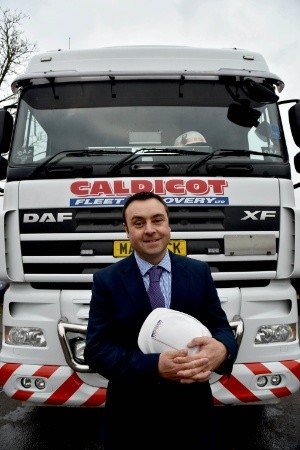In this special feature, we asked several members of the Transport and Logistics industry in Wales;
How can Wales Develop a Green Transport and Logistics Industry?
Their thoughts can be found below.
Chris Hardy, Managing Director, National Express UK Coach

With the Welsh Government declaring a climate emergency, we are currently at a critical turning point in the challenge to reduce emissions and improve air quality. DEFRA figures show that 62% of NO2 comes from local traffic – of that 62%, 24% comes from cars and taxis and only 13% comes from buses.
Modal shift away from private car is the most cost effective and quickest way of reducing emissions.
Mass public transit modes, and coach in particular, have an important role to play in the provision of low carbon, clean transport. Not only does coach perform better on emissions than the average private car (emitting five times less CO2 than a car), it also uses road space more efficiently. A full coach can take one mile of traffic off the road.
National Express have continually invested in the newest and most efficient vehicles available. Our vehicles are on average around 3 years old and all coaches we have bought since 2014 have been Euro VI – the highest emissions standard available.
However, cleaner vehicles must be able to deliver the optimum performance in an urban environment to reduce emissions and improve fuel efficiency savings. This means robust measures to tackle congestion.
We would like to see a broad package of measures to encourage greater use of coach as an alternative to private car, such as road prioritisation measures in favour of public transport to speed up journey times and make public transport a more attractive option.
Gavin Edwards, Managing Director, Caldicot Group
 Here at Caldicot group, environmental impact is something we have a strong interest in, always trying to reduce our carbon footprint as well as trying to employ staff local to our depots to reduce staff travel time to and from work. But there are limits to what we can do, we are not in control of the traffic on the roads, resulting in gridlocked roads and traffic queuing for miles particularly on the stretch of M4 either side of the Brynglas Tunnels. Now the corridor around Newport has been shelved, there seems to be no plan to resolve this issue. In my opinion Wales needs to drastically improve its road networks to reduce traffic build up, to help companies reduce their carbon footprint and fuel usage. Caldicot group have investigated the option of using cleaner energy such as electric vehicles or Natural gas but unfortunately neither the infrastructure for recharging nor technology is widely available enough to make this a viable option.
Here at Caldicot group, environmental impact is something we have a strong interest in, always trying to reduce our carbon footprint as well as trying to employ staff local to our depots to reduce staff travel time to and from work. But there are limits to what we can do, we are not in control of the traffic on the roads, resulting in gridlocked roads and traffic queuing for miles particularly on the stretch of M4 either side of the Brynglas Tunnels. Now the corridor around Newport has been shelved, there seems to be no plan to resolve this issue. In my opinion Wales needs to drastically improve its road networks to reduce traffic build up, to help companies reduce their carbon footprint and fuel usage. Caldicot group have investigated the option of using cleaner energy such as electric vehicles or Natural gas but unfortunately neither the infrastructure for recharging nor technology is widely available enough to make this a viable option.
Paul Cleverley, Marketing & Communications Director, Freight Logistics Solutions
 The environmental impact of transport is significant because transport is a major user of energy, and burns most of the world's petroleum. This creates air pollution, including nitrous oxides and particulates, and is a significant contributor to global warming through the emission of carbon dioxide.
The environmental impact of transport is significant because transport is a major user of energy, and burns most of the world's petroleum. This creates air pollution, including nitrous oxides and particulates, and is a significant contributor to global warming through the emission of carbon dioxide.
The biggest impact of freight and transport on our immediate environment is of course trucks and vans on our roads. With over 300.000 HGVs over 7.5 tonne registered for use on the road in Great Britain (120,000 are tractor units for articulated vehicles) And with 2.5 million white vans (That is 1 White Van to every 24 members of the UK population.) Just 10,000 of these are electric or hybrid with the Renault Kangoo being most popular with its 170mile range
Whilst manufactures are working hard to reduce emissions and release hybrid and electric vehicle’s it will be many years before we see an impact from these. Whilst DAF and Mercedes have released an Artic truck this year it’s restricted to around just 30 miles travel between charging, so is only able to perform short shunting work. Volvo and Tesla are the most promising, 2020 will hopefully see the launch of Tesla’s truck extending travel to 500 miles, but of course like its cars will enter the market at a commercially challenging price point. We have a significant way to go to making a real impact on energy use and pollution.
Generally, the haulage company is only paid per mile to deliver, not to travel to pick up your load or for their journey home after. So if they can find any load to take on route to their pick or for all, or part of their return journey home, it helps cover some of the time and fuel costs, which improves the hauliers profit, reduces costs to the fright booker and very importantly means the vehicle is not traveling empty and causing unnecessary damage to our roads and environment.
A big component of our business is about filling these empty journeys. Our suppliers and encouraged to register their future empty journeys through our driver App, which we then see on our Ops system, this reduces these assurances and having to send another vehicle to run that route again, we find return loads for vehicles that are already running it empty.
The major other factor in unnecessary pollution from transport is over-specified vehicles, where you might see a single pallet on an artic, often manufactures have restricted relationships with hauliers and have little choice in the vehicle type supplied – it’s what-ever the haulier has available in its fleet. With access to over 12000 carriers we make sure the vehicle is cost and environmentally appropriate as possible for load.
All links in a supply chain are connected and impact each other either directly or indirectly. It is our firm belief that understanding our clients’ supply chain as a whole is key in bringing insight in how cargo is transported in the most sustainable manner.
We think that we can affect the emissions by looking at the most efficient way from each client´s unique perspective to transport from point A to B. That requires a lot of knowledge from our employees as well as from our suppliers, but in the end, this will make all the difference. Our employees have all the competence needed in-order for us to give our client the personalised solution that they require. We only work with selected and preferred suppliers. Together we will cut emissions and in the long run be fossil free.
We can’t exit a discussion without the reminder that the enormous up-lift in online deliveries has far exceeded the resource of drivers available. The UK currently needs an additional 60,000 HGV drivers, with around fifty drivers leaving the profession on a daily basis. By the end of the year there are expected to see around 70,000 vacancies. With over 1.6 billion tonnes of goods now transported by road in the UK, and the massive drop of driver availability whilst they are caught up in extended customs issues caused by Brexit – this will have an additional unwelcome environmental impact and is a crisis that needs to be abated.
Paul Fox, Managing Director, Fox Moving
 I started work at 16 in the early days of my father’s removal business which was founded in 1971. I passed my driving test at 17 and acquired a HGV licence at 18 under a Young Drivers Scheme. At around 20, I moved into management running a small branch operation in Cardiff. Since this time I have moved through the business and was a key part of its growth and development. I became Managing Director in 1996 and brought the business back to family ownership in 2000. We presently operate from 9 locations and employ over 130 people. I have always played a leading role in our trade association, the British Association of Removers and was elected President in 2004. My 2 sons and wife also work in the business, making us very much a family business.
I started work at 16 in the early days of my father’s removal business which was founded in 1971. I passed my driving test at 17 and acquired a HGV licence at 18 under a Young Drivers Scheme. At around 20, I moved into management running a small branch operation in Cardiff. Since this time I have moved through the business and was a key part of its growth and development. I became Managing Director in 1996 and brought the business back to family ownership in 2000. We presently operate from 9 locations and employ over 130 people. I have always played a leading role in our trade association, the British Association of Removers and was elected President in 2004. My 2 sons and wife also work in the business, making us very much a family business.
As an owner of a leading Removal & Storage business I have worked in the road transport industry over the last 4 decades. In this time legislation and the complexity of running a business has increased enormously. As a result we are one of only a handful of surviving professional removal companies offering large HGV service to householders in South Wales. A lot of the professional removal operators have been replaced by lightweight van operators. In the last 50 years the number of HGvs have remained at 400-500,000 whereby light van registrations have gone from 2.2m to 3.8m in 20 years. In this time traffic has practically doubled to 40,000 million vehicles.
We face daily traffic jams, hugely increasing pollution and driving down productivity. Local government have put down multiple restriction and so our drivers face fines for just doing their job and trying to navigate around built up areas. This is a factor with the acute national HGV driver shortage and many companies are now opting to use small vans, performing many more journeys.
HGV traffic is essential and targeting these professional operators with Clean Air Zones will only drive more traffic to the roads as goods get carried by small vans. We all have based our lives on cars and going electric may improve air quality (arguably) but it won’t answer the chronic congestion we all face. Buses and taxis need to be prioritised for electric or even better, hydrogen cell technologies. These are the vehicles than run around in urban areas emitting gases, all day and every day. Taxis in particular are predominantly old, worn and inefficient as far as emissions are concerned.
I am a keen sports cyclist and whilst city bikes are helpful their use is limited; that is to the fit and able. Even then it is a very weather dependent mode of transport and frankly very dangerous. Park and ride in my view is a great option, given that most people will start their journeys via car.
Ben Pulford, Head of Sales and Marketing, Llew Jones International
 ‘Eco’ is a primary focus for lots of industries but especially the transport industry. A lot of eyes are on us to be the pioneers in looking to reduce our industries carbon footprint. With the advent of electric, hybrid and now hydrogen powered vehicles proves that there are options – But can we realistically support this capital outlay? Unfortunately the increased cost would need to be transferred to the customers. I think a short term plan would be to look to offset the carbon footprint in other methods. As the official transport provider for this years National Eisteddfod in Llanrwst we have arranged a number of daily routes from the surrounding North Wales area to allow people to leave their cars at home.
‘Eco’ is a primary focus for lots of industries but especially the transport industry. A lot of eyes are on us to be the pioneers in looking to reduce our industries carbon footprint. With the advent of electric, hybrid and now hydrogen powered vehicles proves that there are options – But can we realistically support this capital outlay? Unfortunately the increased cost would need to be transferred to the customers. I think a short term plan would be to look to offset the carbon footprint in other methods. As the official transport provider for this years National Eisteddfod in Llanrwst we have arranged a number of daily routes from the surrounding North Wales area to allow people to leave their cars at home.














